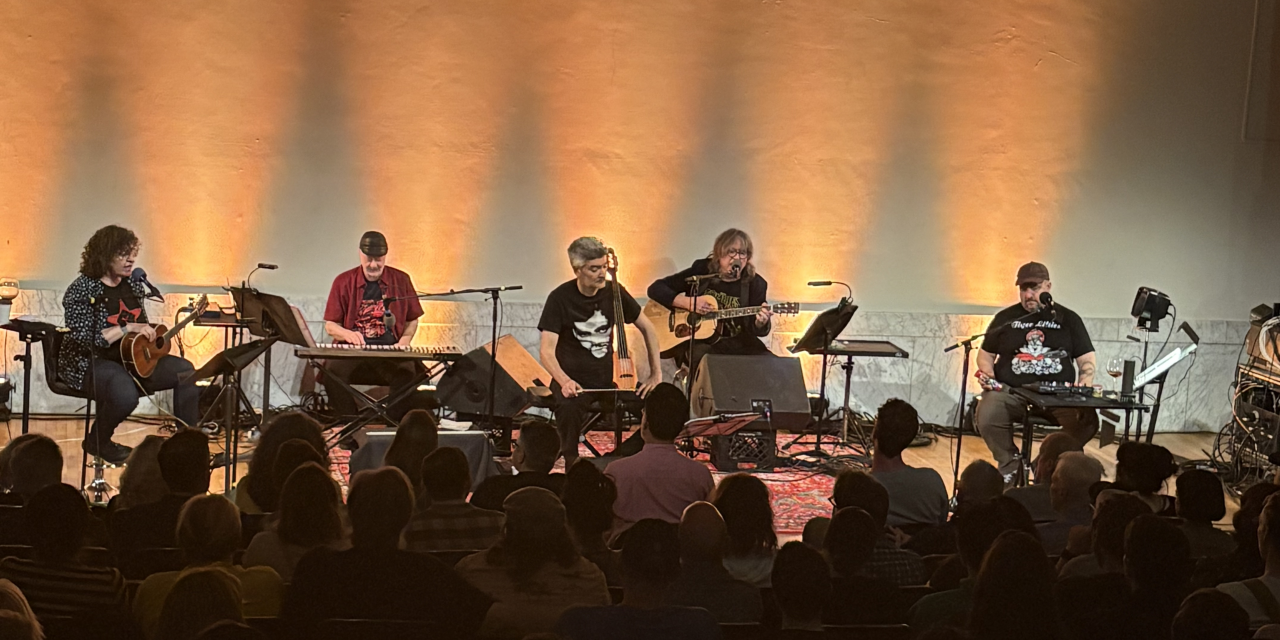Before you read my article, I want you to stop and think for a second. How far would you be willing to go to see your favorite band play your favorite album live? Before I answer this myself, let me introduce The Magnetic Fields and their most prominent album, 69 Love Songs.
Few albums dare to take on a concept as undefinable as love itself, but 69 Love Songs by The Magnetic Fields does so with intelligence, allure, and an impressive disregard for convention. Released in 1999, the three-volume opus from songwriter Stephin Merritt is less a straightforward collection of songs and more an exploration of love songs themselves. Across 69 tracks, Merritt blends an almost dizzying number of genres, moods, and perspectives as he strives to deconstruct your views on love itself.
Praise from many critics and music fans alike doesn’t tell you why I love this album. This album helps identify and digest the widespread yet alluring concept of love, whether that be romantic, platonic, or something in between; this album envelopes such a wide variety of forms and functions of love. From songs like “The Death of Ferdinand de Saussure,” which captures profound ideas of love through linguistic references, to “Absolutely Cuckoo,” a humorous caution for those looking for love in emotionally unstable partners. This album has a song that fits whatever type of love you are, have, or will experience. Even beyond love, 69 Love Songs is a deeply human work that offers insights into the complexities of emotion, communication, and many other aspects of our daily lives. Each person will have a different experience with this album which is what makes it so special.
After explaining why 69 Love Songs by The Magnetic Fields is my favorite album, I’ll tell you how far I would travel to hear my favorite album live. This past weekend, I took a trip to Pittsburgh, PA, to visit my best friend and see this album performed over two days in the Carnegie Library Lecture Hall. You read that right: I traveled over 800 miles to see my favorite album live, and it was 100% worth it. Not only was the performance itself amazing, but the city and venue were incredible as well. The Carnegie Library Lecture Hall was a perfect venue for the show, with an intimate and historic setting, blending the classical charm of the architecture with the eclectic sound of The Magnetic Fields.
On the first day, the band played the first 35 songs from “Absolutely Cuckoo” to “Promise of Eternity,” and as hard as it was to choose a favorite, I narrowed it down to 3. The first of these is “Time Enough for Rocking When We’re Old,” which focuses on youth, spontaneity, and love. When played live, the harpsichord is switched for Shirley’s ukulele, which gives the song a delicate twist. The second was “I Don’t Want to Get Over You,” which was my introduction to this album and balances the feelings of self-pity and quiet acceptance, making it both heartbreaking and relatable. And finally, my favorite track from Night 1 and my second favorite track on the album, “The Book of Love.” This beautifully simple song explores something as timeless, intense, and difficult to understand as love through an almost religious idea of a book that holds the history of love.
As for Night 2, I couldn’t exactly narrow it down to 3, so I chose 6. The first of these is “Yeah! Oh, Yeah!” which is satirical and chaotic, reflecting a couple’s fight where one side doesn’t seem to care and answers only with “Yeah! Oh, Yeah!” In the live version of this song, Stephin Merritt and Shirley Simms play the arguing couple, each holding a glass of wine as Stephin shrugs off Shirley’s questions. While great, this song usually doesn’t catch my attention, but the chemistry between Shirley and Stephin made such a lasting memory. Next is “I Can’t Touch You Anymore,” which is about emotional distancing and the painful realization that the relationship is fading. This is another track that generally isn’t in my favorites, but something about Stephin’s soft yet daunting delivery made it feel much more isolating in-person. In the middle of my list is “Busby Berkeley Dreams,” which uses the metaphor of Busby Berkeley’s iconic film choreography to portray the idealization of relationships. Next is “The Night You Can’t Remember,” a bittersweet and self-aware of the emptiness of disconnected relationships. While the lyrics in this song are poignant and melancholic, I just really like how catchy, upbeat, and ironically cheerful it sounds. Consisting of Anthony Kaczynski’s lone acoustic guitar and the deep vocals of Stephin Merritt, I just can’t get over how lovely it sounded. My second favorite song from Night 2 was “Epitaph for My Heart,” an introspective reflection on emotional loss and closure. The beginning, which comes from the caution label on a keyboard, refers to his need for “qualified service personnel” to fix his broken heart. After this intro comes the somber, slow-burning chorus, an epitaph for a dead or broken heart. Finally, my favorite song on the album and in general, “The Death of Ferdinand de Saussure,” is a theatrical, rock-infused track with some of the most dense lyricism in Stephin Merritt’s discography. This track is an argument between two conceptual ideas of love: Ferdinand’s, which is centered around arbitrariness, and Holland-Dozier-Holland’s, which is centered around heartfelt actions.
Being able to see this show live has truly been a life-changing experience. If you are interested in anything I have just mentioned above, I cannot recommend this album enough, and if you don’t want to dive into the whole album, any of the songs I talked about are great places to start.
Just like Andy from the song “The Luckiest Guy On The Lower East Side,” who “would bicycle across town in the rain just to bring you candy,” I would travel another 800 miles just to see The Magnetic Fields perform 69 Love Songs again.
Let me leave you with a lyric from “The Death of Ferdinand De Saussure.”
“We don’t know anything
You don’t know anything
I don’t know anything
About love
And we are nothing
You are nothing
I am nothing
Without love”
Photo Credits: Z Marik
My name is Z Marik, and I am the Digital Media Director at WVUA-FM. I am a Junior, majoring in Operations Management with a minor in Supply Chain Management.
My favorite album is 69 Love Songs by The Magnetic Fields.
Thanks for reading my articles!








